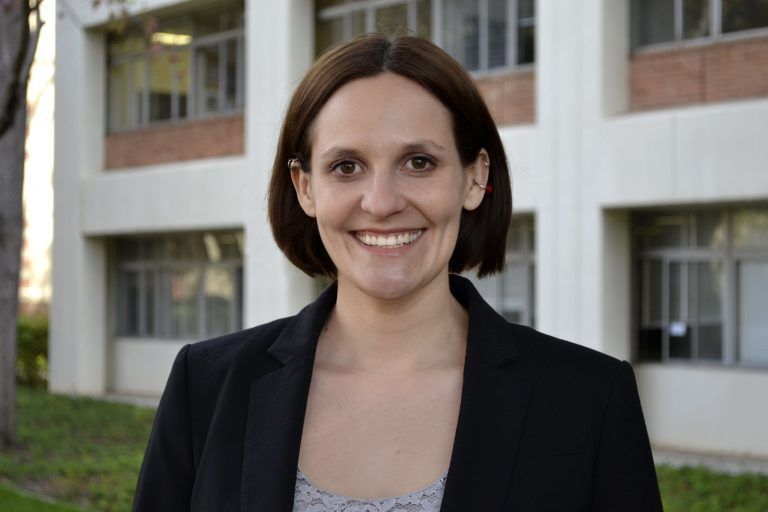Research is an iterative process, where experiments need time to ensure results are accurate. But Stephanie Seidlits, PhD is heading up a research lab at the University of California, Los Angeles (UCLA), with the goal that their discoveries will speed up the process and help get answers to brain tumors faster with more information, less cost, but at the same level of accuracy as traditional methods of research.
In 2014, Stephanie became the principle investigator of a lab at UCLA where she started studying artificial three-dimensional environments that resemble brain tumors and surrounding tissue. Four years later, Stephanie was awarded the ABTA Discovery Grant, one-year $50,000 grant for high risk, high impact research with the potential to change current diagnostic or treatment models. Her research project, “A biomaterial approach to identify mechanopathology driving glioblastoma invasion,” focused on a new way to study brain tumor cells by engineering biomaterials that mimic the tumor environment of glioblastoma multiforme (GBM).
The biomaterial-based approach is less costly, more time efficient and better controlled than animal models, like mouse studies. Yet, unlike other cell culture methods, this approach yields results comparable to animal models typically used in preclinical research. Ultimately, this new approach seeks to identify specific interactions within the GBM cells and the tumor environment that lead to aggressive tumor progression. This new model could help understand whether disrupting these interactions could benefit patients by preventing or delaying tumor recurrence.
“These models provide a new way to study brain tumors and develop new therapies, which is cheaper and faster than using animals, while better capturing the actual properties of tumors in the human brain than traditional methods for culturing tumors outside of the body,” said Stephanie.
Early Discoveries in Science
Stephanie recalls her interest in the brain around the second and third grade, when her classes would focus on how the brain worked. By the sixth grade, Stephanie’s science class focused on human DNA and how it was the “little universe inside of us.”
“I was also attracted to research and puzzles, solving problems and the pathology of our bodies, particularly the brain,” said Stephanie.
After her first year in college, she switched her major from biochemistry to bioengineering because of the potential to impact patient lives with her studies and discoveries.
As she’s leading her lab and mentoring undergraduate students, Stephanie believes scientific and medical research needs more women and diversity in the lab. “A big part of our job is problem solving and with that the need for new approaches to solve these problems,” said Stephanie. “In order to do that we need more different viewpoints to tackle diseases, like brain cancer and brain tumors.”
A big part of our job is problem solving and with that the need for new approaches so we need more different viewpoints to tackle diseases, like brain cancer and brain tumors.”

Shaping Careers in Brain Tumor Research
ABTA grants provide seed money that blossom careers and expand research potential into larger projects and discoveries.
“When I was awarded the ABTA Discovery Grant, it provided critical funding to support my research program as a new principal investigator that I started six years ago at UCLA,” said Stephanie. “The ABTA grant also enabled us to acquire solid data that has now led to a five-year, $1.25 million grant from the National Institutes of Health.”
Additionally, the ABTA grant helped Stephanie hire another researcher and acquire crucial lab materials to run experiments. Importantly, the network of other researchers she met through the ABTA have helped foster new ideas and directions.
“I expect these interactions will continue to move my lab’s research closer to meaningful breakthroughs.”
Beyond Brain Tumor Breakthroughs
The ABTA is dedicated to funding research that has the potential to change the lives of people impacted by brain tumors. To date, the ABTA has awarded nearly $33 million in brain tumor research.
Learn more about the ABTA Research program and available grant opportunities.














